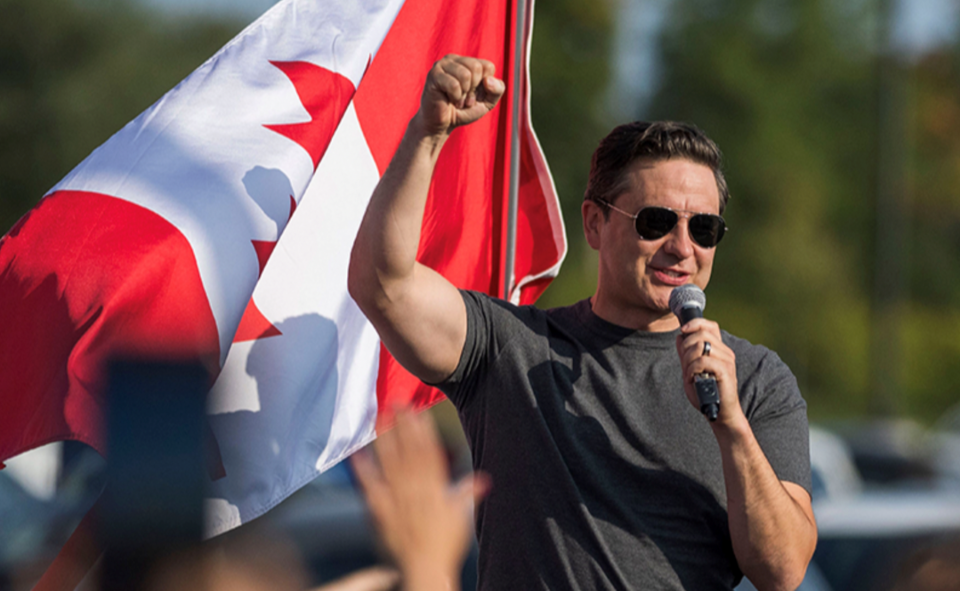Nail-biter it was not.
The midnight oil need not have burned to learn late Monday that Pierre Poilievre would banish the 213 candidates running against him—a large turnout, dominant as Shohei Ohtani would be this week if he were playing in the Little League World Series.
The Conservative leader, on a five-month involuntary leave after losing his seat of 21 years, can now reclaim his lone adult-age job in the House of Commons when it resumes in mid-September. His central Albertan summer holiday in—probably his foreseeable trek to—Battle River-Crowfoot is done. Four-fifths of a healthy 58-per-cent turnout fully restore his status, and of course that isn’t all he wants.
But his electoral return is less like getting back on a bike and more like getting back on a rodeo bull. The byelection affirmed his base but didn’t extend his brand. The road ahead, after snatching defeat from the jaws of victory, is a test of character—his and the country’s—if he really and truly believes he ought to be the prime minister one day.
There were many noteworthy accomplishments for the Conservatives in April, like the largest vote share since 1988, 25 more seats, a breakthrough in attracting younger and working-class support, and steps in the seat-rich cities around Toronto and NDP territory in northern Ontario. But does anyone in politics really get a second chance anymore? The country is about to tell us.
Only nine months ago, a 25-point poll lead made a hefty Conservative win seemingly inevitable. Then Trump 2.0 arrived, then Trudeau 2.0 departed, then Poilievre 2.0 didn’t materialize. The negatives amplified and positives atrophied in a matter of a few wild weeks. The effective interrogator in the Commons didn’t avail the best muscle groups in the campaign.
The country swung swiftly toward an inexperienced political leader with a better professional CV as the safer haven against the existential creature to the south. Poilievre and his party encountered the perfect storm. Mark Carney was, as former Conservative leader and Quebec premier Jean Charest put it, the luckiest flipping politician alive—although he used a different adjective.
A reasonable question is whether Poilievre will resume his squalid schtick or accept that it didn’t click. Is he done with three-word policies, surly schoolyard nicknames for rivals, mansplaining talk-overs, even the contempt for my craft when it tries to pierce the performative veneer to find the human being inside the automaton?
A larger question is what new ideas he has (yes, some were stolen by Carney) to narrow the widening gap between his party and the Liberals, between himself and the prime minister, while our sovereignty is so unsettled. It’s not as if he doesn’t have, and won’t have, material to work with. If young voters are fraught about their housing prospects, does anyone really think this government—any government—can address that? And how affordable can this government—any government—make our lives once they aren’t?
The supersized question is how much runway to run the party he actually has. Different swords hanging over him.
One is a leadership review. In part because he ran a campaign as the lone face of the brand—candidates didn’t participate in debates or grant media interviews to the same extent—it is difficult to fathom how he wouldn’t survive it in January to leave open a second shot at government that neither former Conservative leaders Andrew Scheer nor Erin O’Toole was given. As luck would have it, no one built any profile to impress as a potential successor. And of course, Ontario Premier Doug Ford, the Conservative with the highest profile these days, likes Carney more than he likes Poilievre, so he is on Team Canada more than Team Conservative, at least for the time being.
Then there is also the live tool of the Reform Act, which permits caucus members to oust a leader at any time if one-fifth ask for a review and more than half vote to show him the door. Happened to O’Toole. Might one day happen to Poilievre if the poll numbers don’t rebound. But unlikely soon.
The reason: the possibility of another federal election as early as next spring. Much as Donald Trump has toggled tariff threats up and down, and on and off, and seriously and casually, the most decisive event to reset our economy will be the renegotiation in 2026 of our continental trade deal.
It is a decent bet the discussions will be more provocation than conciliation, so they might produce nothing but a battered deal and a barrage of tariffs—perhaps the end of continental free trade, perhaps the era of pay-as-you-play trade. Any outcome might prompt an election, one initiated by Carney to gain a mandate in a majority, or his opponents sensing an opportunity to topple the Liberals in the aftermath of a trade promise that didn’t deliver.
But the sword that matters is the electorate’s doubt he is best to lead. Once his weakened opponent left the scene, he was quickly not the next man up. What can he do about his own weaknesses in connecting to produce a different result when—or if—he gets the next opportunity?
Poilievre has been a formidable Commons force for accountability as an opposition leader, and frankly Carney needs a foil that challenges him to raise his own game, so the byelection stands to be healthy for the system. But the Conservative leader has to tango with a popular early-stage leader instead of waltzing with an unpopular late-stage one. Let’s see if he’s learned some new moves on the dance floor, like how to take one step back before his typical two steps forward. I’m not after fireworks, just someone to light a fuse under the country.
Kirk LaPointe is a Lodestar Media columnist with an extensive background in journalism. He is vice-president in the office of the chair at Fulmer & Company.



